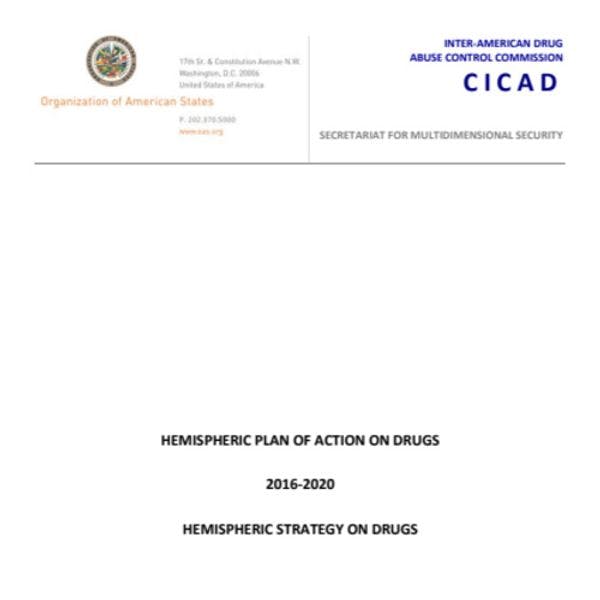Hemispheric Plan of Action on Drugs 2016-2020
In the Americas the world drug problem manifests as an increasingly complex, dynamic and multi-causal phenomenon that has adverse effects on health, social cohesion, citizen security, the integrity of democratic institutions, development and economic activities in the countries of the region, with political, economic, social and environmental costs. This requires a comprehensive, balanced, multidisciplinary and evidence-based approach that takes into account the causes of the problem, in full respect of human rights and fundamental freedoms.
In that regard, the Hemispheric Plan of Action on Drugs 2016-2020 is a supporting guide for continuing the implementation of the established guidelines in the Hemispheric Drug Strategy (2010) and the commitments undertaken by member states in the Declaration of Antigua, Guatemala, "For a comprehensive policy against the world drug problem in the Americas" (2013); in the Resolution of Guatemala, "Reflections and guidelines to formulate and follow up on comprehensive policies to address the world drug problem in the Americas" (2014); and in the outcome document of the Special Session of the United Nations General Assembly on the world drug problem, held from April 19-21, 2016 in New York City, entitled, "Our joint commitment to effectively addressing and countering the world drug problem" (2016), among other relevant resolutions approved in this area during the past four years. Additionally, the Plan of Action acknowledges the 2030 Agenda on Sustainable Development and notes that the efforts made towards achieving the Sustainable Development Goals and to effectively address the world drug problem are complementary and mutually reinforcing.
Through this Plan of Action, member states reiterate their commitment to continue furthering progress in the Hemisphere, addressing the world drug problem, placing individuals at the core of drug policies and taking into account gender, age and cultural issues, as well as, when appropriate, inputs from civil society and other social actors, and addresses the new challenges faced by countries, within the framework of the three international drug control conventions and other relevant international instruments, in full respect of the purposes and principles of the United Nations Charter, international law and the Universal Declaration of Human Rights.
Keep up-to-date with drug policy developments by subscribing to the IDPC Monthly Alert.
